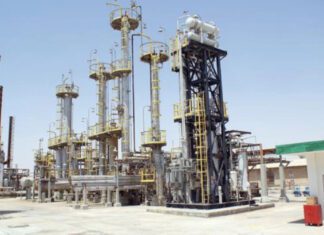Over the past few months, inflation has afflicted the liberated areas which in turn has led to a massive increase in prices of everyday necessities. Bread, the staple food for Syrians, is slowly becoming unaffordable for a people already beset by economic and food insecurity. This has led to locals demanding the Syrian Salvation Government (SSG) to take strict measures to regulate prices, especially for bread.
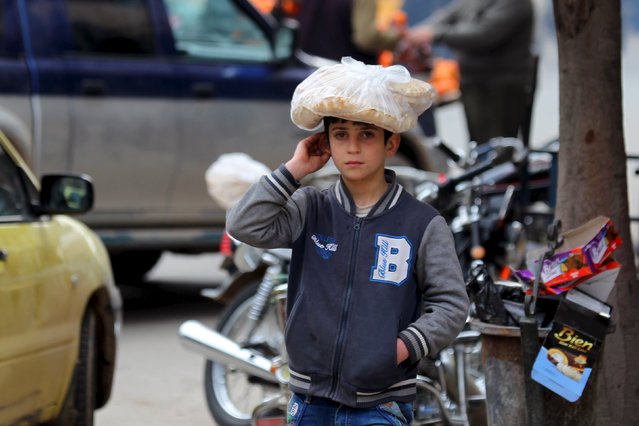
The Turkish Lira, the circulating currency in Idlib and its surroundings, has skyrocketed since October hitting over 12 Liras per Dollar. When it was first introduced in Idlib, in June 2020, it was worth 6.8 Liras per Dollar approximately, almost half the amount it is now. The currency’s instability and devaluation has resulted in a drastic increase of prices which the majority are unable to cope with.
Moreover, the global increase in crude oil and gas prices, has also affected the affordability of fuel in the liberated areas. The instability of the Turkish Lira combined with the cost of crude oil jumping from $40 to around $80 a barrel within the span of a year resulted in a possible economic crisis. Prices of fuel in Idlib have doubled since November last year, petrol prices rose, approximately, from 4.70 TL to 10.
On top of that, the international crisis on wheat has only added insult to injury, further complicating the issue. In comparison to the annual price of a ton of wheat, from November 2020 to November this year, it has risen drastically from $205 to $289 according to Business Insider.
The Minister of Economy and Resources, Dr. Mustafa Musa, said that the ministry is seeking to solve the bread price crisis, stressing that the price hike is global and is due to the rise in oil and flour prices, in addition to the deterioration of the value of the Turkish currency, because it is the most traded currency in the liberated north.
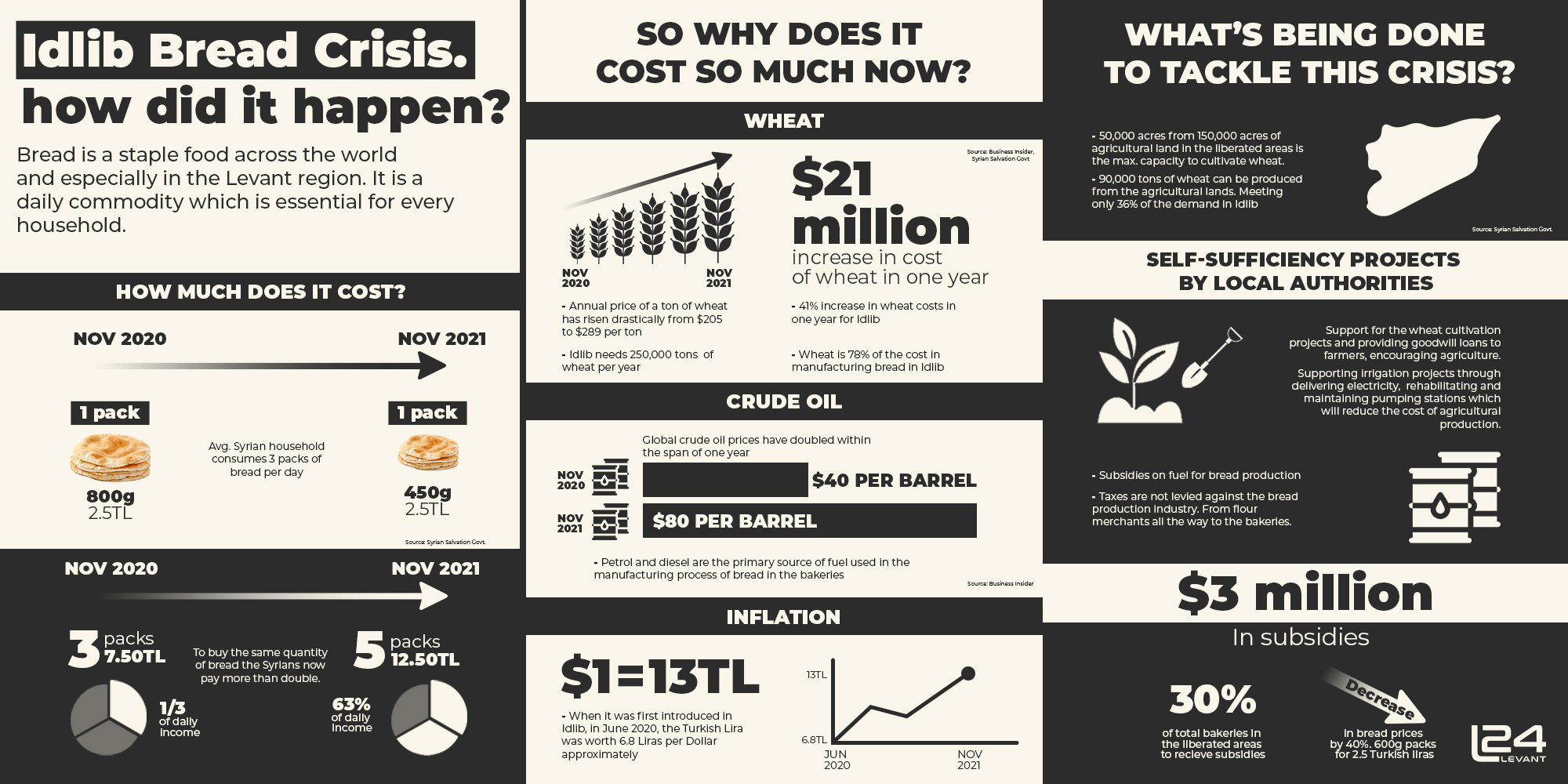
In an interview with Levant 24, Hasan Uthman, Supervisor of Strategic Reserves and Distribution from the Ministry of Economy and Resources in the SSG stated that the reason we witnessed a significant rise in wheat price is due to the global drought, where the quantity of wheat supplied from Europe has recently fallen, while the production of wheat in the United States has likewise decreased by 5 million tons.
Moreover, the Mediterranean region has also been hit by a drought, leading to a decrease in global stocks and an increase in demand by 40%. He added that the Corona pandemic, the closures of borders and trading between nations, also have had a big role to play.
According to Mr. Uthman, Idlib needs up to 250 thousand tons of wheat annually and the amount the ministry purchases is equivalent to 20% of its needs. He added that the Ministry of Economy and Resources has prepared a case-study for ‘Self-sufficiency of Wheat’ in the liberated areas. The study showcased that if all agricultural lands were planted with wheat, they would produce 90,000 tons, which would cover up to 36% of the needs of the liberated areas.
During the General Shura Council emergency meeting with the Ministry of Economy and Resources in the Salvation Government, held yesterday, the effect of the inflation was discussed and solutions to regulate the rising bread prices were presented. Abu Muhammad al-Jolani, who was invited to the conference, said: “In the liberated areas there are 150,000 acres of agricultural lands, but it is not possible to cultivate all of them with wheat. From it, 50,000 acres is for wheat production. We were actually able to plant two-thirds of them with wheat and work is underway to fully invest in the remaining.”
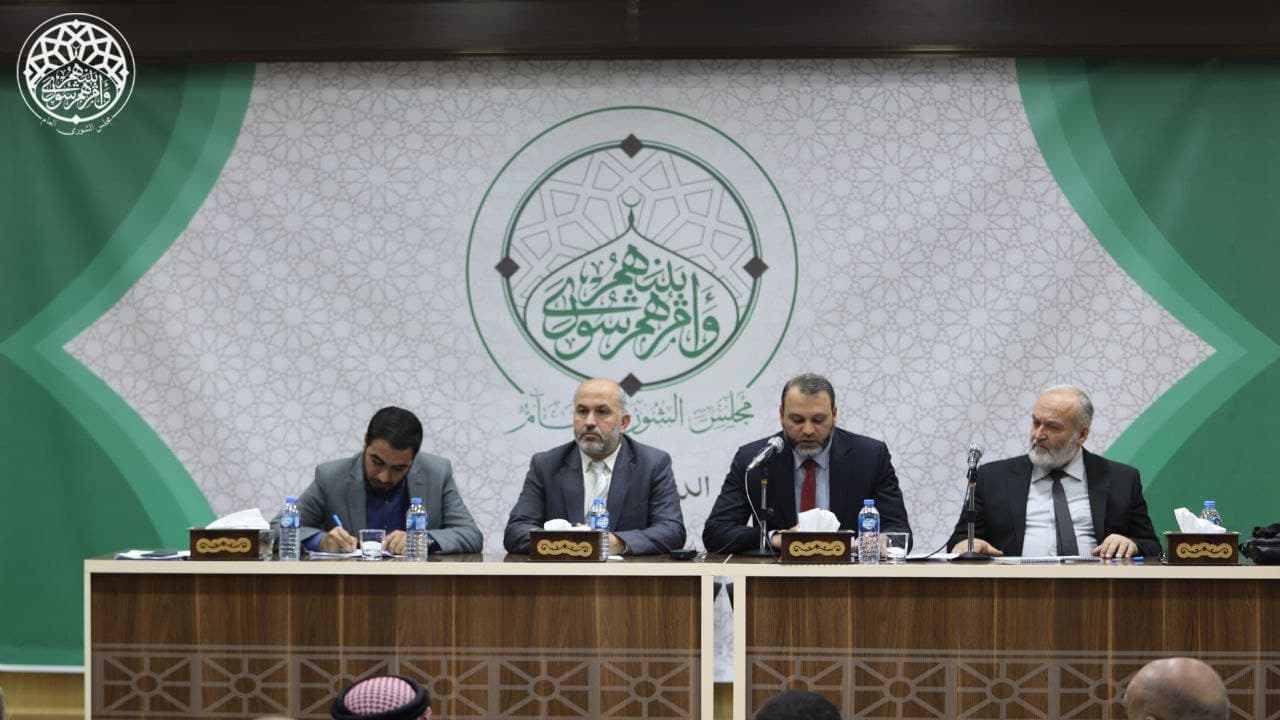
Ahmed Abdel Malik, Assistant Minister of Economy and Resources in the SSG said, “In the last two months, bread prices have increased by 20% due to the global wheat crisis, as the cost of flour constitutes 78% of the costs of bread production.”
Malik added, “There are a number of plans and studies by the SSG, which shall bear positive results in the coming days.”
He confirmed that the SSG does not impose any taxes on flour merchants or on the bread production process, and that they are working through the Directorate of Bakeries to control the profit margin of private bakeries in order to protect the consumers.
The SSG have introduced several initiatives in the past year to alleviate some economic woes of the region. Chief among them:
A wheat cultivation project which provided goodwill loans to farmers to encourage the establishment of beneficial agricultural projects.
Improving irrigation by providing electricity, maintaining irrigation and pumping stations, thus reducing the costs of cultivation.
Stimulation of the industrial sector through establishment and refurbishment of infrastructure, increasing the numbers of individuals with technical expertise through educational, vocational and economic programs. Implementing strategic industrial projects aimed at reducing imports and increasing job opportunities through local industry and manufacturing.
Investing in vital infrastructure such as roads, residential and commercial buildings, and electrical and communication service networks all of which create an environment conducive to providing secure and attractive employment opportunities for citizens.
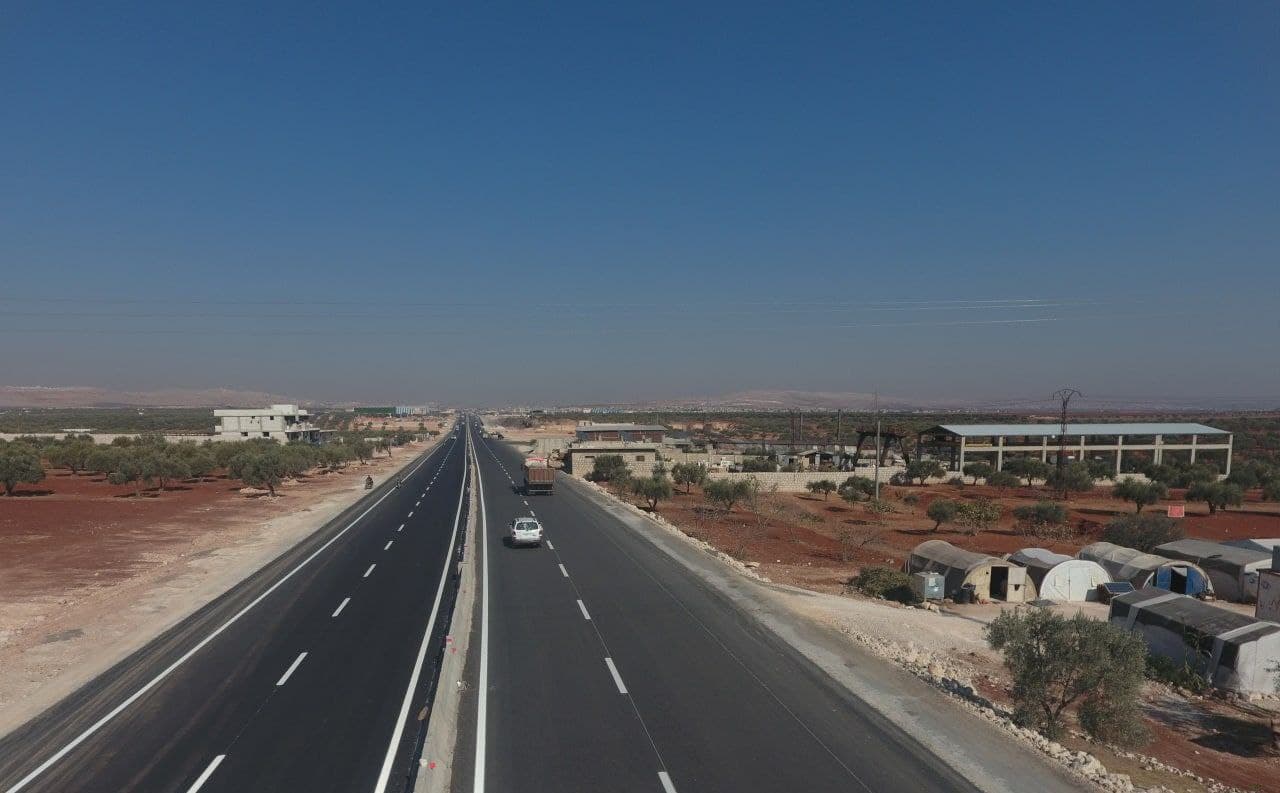
Yesterday, during the General Shura Council meeting, it was announced that bread will be subsidized in the liberated areas with an amount of approximately 3 million dollars, where the weight of a bag will be 600 grams, at a value of 2.5 Turkish Liras.
The head of the SSG, Eng. Ali Kidah, said during the meeting: “The world today is going through a difficult economic situation and crisis due to the high price of oil, gas, and food commodities. The economic crisis is afflicting all countries of the world, even countries that have strong economies. Our government has, and still is, making efforts to develop the liberated areas at all levels, the economic crisis is an international crisis targeting everyone, and we are the first affected by it.”
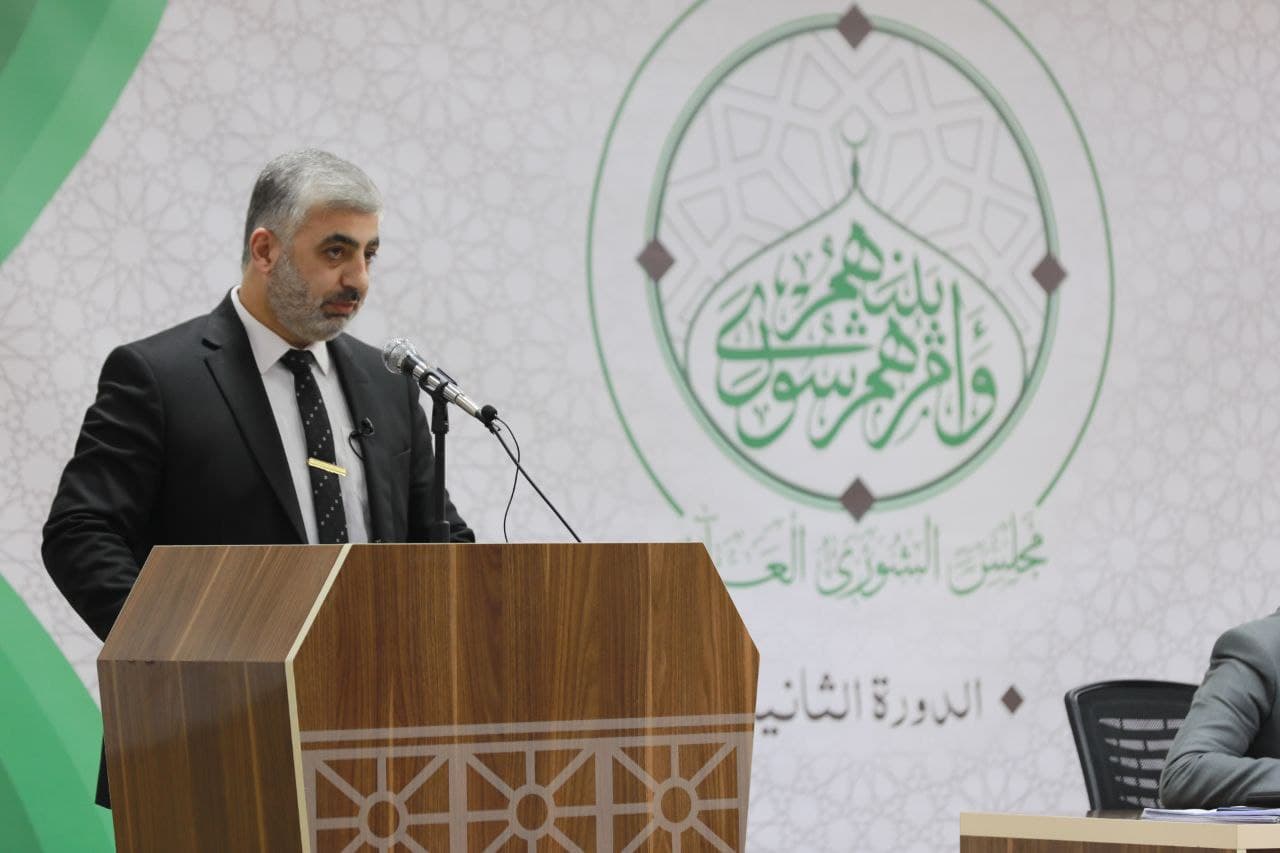
“We bear a great deal of responsibility, it is our duty to regulate prices, combat fraud, and monitor merchants, we must do everything we can to address this crisis in a way that alleviates the people’s suffering”, added Mr. Kidah.
The head of HTS also stressed that the economic development of Idlib has a strategic plan to be achieved in stages. Stating that the first stage was through preserving the human resources and supporting schools and universities.
“Without educated and effective human resources, the economy cannot prosper, and this is what the institutions in Idlib are working on”, Jolani said. “The second stage is to create an infrastructure capable of establishing projects that will benefit the people, as this was seen recently through the ongoing construction of the Bab al-Hawa Industrial City project, which started last month. The third stage is to establish projects and reduce unemployment rates by creating job opportunities.”

Inevitable inflation is far from over, even with all of these measures. With the harsh winter just beginning many are daunted at the prospect of inflation during a time when finances are strained due to costs of heating much of which is dependent on gas and crude.
Under such circumstances, it is imperative that the international community cooperate in finding solutions that can be implemented to ensure the food and financial security of the millions of Syrians currently living in the liberated north.

